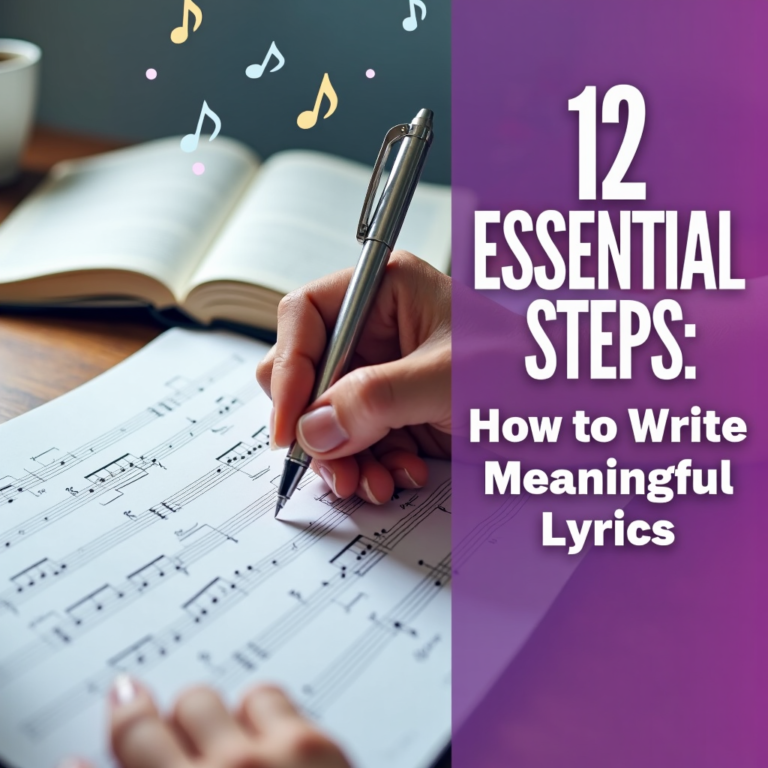As a songwriter you really need to improve your songwriting skills by learning how to write meaningful lyrics, we all know how important and impactful meaningful lyrics are in a song, so here in this article, we are going to teach you How to Write Meaningful Lyrics That Resonate with Listeners.
Why Writing Meaningful Lyrics Matters
In music, lyrics are so much more than words set to a melody. They’re a window into emotions, stories, and moments that listeners can feel, understand, and relate to. Good lyrics take a song beyond catchy rhythms and pleasing chords—they create a connection, making us feel seen and understood, no matter who we are or where we come from.
Think about the songs that have stuck with you over the years. They probably aren’t memorable just because of the beat or the melody; they’re memorable because the lyrics said something real. Maybe they reminded you of a specific memory, brought a tear to your eye, or gave you strength when you needed it. That’s the magic of meaningful lyrics. They don’t just fill space; they reach out and touch people. They make listeners feel less alone.
For us as songwriters, creating those kinds of lyrics can be one of the most rewarding parts of making music. When you write with authenticity and purpose, you’re giving listeners something to connect with, whether they’re hearing your words for the first time or the hundredth. You’re giving them something to hold onto, something that might resonate with them long after the music fades. So, while a good melody can make a song fun, meaningful lyrics are what make it unforgettable.
1. Understand Your Purpose as a Songwriter
Purpose-driven lyric writing goes beyond rhyme and structure. It’s about the message you wish to convey. As a songwriter, your purpose might stem from wanting to share stories, evoke emotions, or create a sense of belonging among listeners. Defining your purpose not only shapes your songwriting style but also deepens the connection with your audience.
Example: Take a song like Imagine by John Lennon. Its universal message of peace resonates because of Lennon’s clear purpose and intention behind each lyric.
Tips for Defining Your Purpose:
- Ask yourself what message you want each song to carry.
- Think about how your purpose aligns with your life experiences and values.
- Experiment by writing lyrics focused on different themes (e.g., hope, love, change) and see which feels most authentic.
2. Know Your Audience and What Resonates with Them
Knowing your audience will help you make lyrics that feel personal yet relatable. Whether you’re speaking to people who love soulful ballads or rock anthems, understanding their preferences can guide your language, tone, and themes.
Insight: If your audience is predominantly young adults, themes around self-discovery, love, and resilience often resonate well. For older audiences, lyrics around nostalgia and life lessons might strike a chord.
How to Research Your Audience’s Preferences:
- Look at the lyrics of popular songs in your genre and analyze recurring themes.
- Engage with your fans on social media; ask them about the songs or lyrics that have impacted them.
- Study audience comments on your past songs (if you’re already performing) or similar artists to identify what they enjoy or connect with.
3. Draw from Personal Experiences and Emotions
Your own experiences and emotions are powerful sources for authentic lyrics. Reflect on moments of joy, pain, or triumph that have shaped you. Songs like Someone Like You by Adele resonate because listeners can sense the raw emotion behind the words.
Tip: You don’t have to be explicit; even abstract lyrics can carry personal weight. For example, instead of detailing a breakup, you could focus on the emptiness or growth that followed it.
Strategies for Using Personal Experiences in Lyrics:
- Free-write about your emotions without worrying about rhyme or structure, then extract powerful lines.
- Think of metaphorical ways to describe your experiences to keep them universal but emotionally resonant.
- Use journaling to capture real-time thoughts and emotions that you can revisit for inspiration.
4. Study Great Songwriters and Analyze Their Techniques
One of the best ways to improve as a lyricist is by learning from the masters. Study the works of songwriters who are known for their impactful lyrics, like Bob Dylan, Joni Mitchell, or Kendrick Lamar.
Case Study: Bob Dylan’s The Times They Are a-Changin’ uses simple but direct language to reflect societal shifts. His lyrics are timeless because they’re both straightforward and relatable.
How to Analyze Song Lyrics Effectively:
- Focus on the themes and how the songwriter introduces and builds upon them.
- Study the rhyme schemes and how they contribute to the song’s flow and memorability.
- Note any unique structures or techniques, like storytelling or dialogue, that make the lyrics stand out.
5. Develop a Central Theme or Message
Every great song has a unifying theme. This theme serves as the song’s backbone, keeping it cohesive and clear. Think of the theme as a guiding principle, like a north star for your lyrics.
Example: Let It Be by The Beatles revolves around a theme of acceptance and hope. Even if you don’t know the backstory, the theme is evident and powerful.
Steps to Craft a Strong Theme:
- Brainstorm the message you want listeners to walk away with.
- Summarize your song’s theme in one sentence, then let it guide your verses and chorus.
- Avoid cramming too many ideas; stick to one or two core messages.
6. Experiment with Metaphors, Similes, and Imagery
Metaphors and similes create vivid images that listeners can feel. Instead of saying, “I’m sad,” try using imagery like “a wilted flower beneath the rain” to evoke the same emotion more powerfully.
Example: “You’re like a broken glass” uses a simile to suggest fragility without explicitly stating it.
Tips for Using Figurative Language:
- Use metaphors that are unique but not overly complicated.
- Balance literal lines with figurative ones to keep your lyrics accessible.
- Try describing emotions with sensory language (sight, sound, touch) to create vivid imagery.
7. Play with Structure and Rhyme Schemes
The structure can make your lyrics more memorable and engaging. Experiment with different rhyme schemes and consider how each part of the song (verse, chorus, bridge) can reinforce your theme.
Example: A-B-A-B rhyme schemes create a predictable flow, while A-A-B-B can make a song feel more narrative.
Common Structures to Try:
- Verse-Chorus-Verse-Chorus
- Verse-Pre-Chorus-Chorus
- Verse-Verse-Chorus-Bridge-Chorus
Rhyme Tips:
- Don’t force rhymes; focus on natural flow and impact.
- Mix up rhyme types, like near rhymes or internal rhymes, to add texture.
8. Write from Different Perspectives and Voices
Exploring different perspectives can add depth to your lyrics, helping you convey emotions and experiences in diverse ways. This is a powerful tool for creating lyrics that feel fresh and relatable.
Example: Writing from a third-person perspective allows you to tell a story without being confined to personal pronouns, as in Taylor Swift’s Love Story.
Ideas for Perspective-Shifting:
- Try writing from another character’s viewpoint to explore new themes.
- Use dialogue to make lyrics feel conversational.
- Experiment with shifting from first to third person for variety.
9. Avoid Clichés and Strive for Originality
Clichés can make lyrics feel uninspired and predictable. Instead, find new ways to express common emotions, using unique descriptions to keep your writing fresh.
Tip: Instead of saying, “I feel lost,” you could try, “Like a compass spinning in the dark.”
How to Spot and Avoid Clichés:
- Question every line—is there a more creative way to say it?
- Replace overused phrases with your own experiences or new metaphors.
- Experiment with unexpected combinations of words for originality.
10. Refine Your Lyrics with Feedback and Editing
Great songs often require multiple drafts. Editing your lyrics and seeking feedback can help you refine your message and clarify your expression.
Example: Paul McCartney famously rewrote the lyrics to Yesterday several times to find the perfect words.
Tips for Effective Editing:
- Take a break from your song before editing to gain a fresh perspective.
- Read your lyrics aloud to spot awkward phrases.
- Seek constructive feedback from trusted peers or mentors.
11. Find the Right Balance Between Specificity and Universality
Striking a balance between specific details and universal themes can make your song feel personal yet relatable. Specific imagery draws listeners in, while broader themes allow them to interpret the song in their own way.
Example: In Fast Car by Tracy Chapman, specific details like “driving in your car” add realism, while the broader theme of escape resonates universally.
Guidelines for Balancing Specificity and Universality:
- Use specific images that evoke universal feelings, like longing or freedom.
- Let the chorus express the main theme while using specific details in verses.
- Test your lyrics by asking if they’re clear enough to evoke emotions but open enough for personal interpretation.
12. Practice and Persevere – Keep Writing and Improving
Songwriting is a skill that improves with time and practice. Every song you write is a step toward developing your unique voice and style, so embrace the process.
Inspiration: Even legendary songwriters didn’t write hit songs overnight. Keep creating, experimenting, and learning from each piece.
Ways to Build Consistency in Songwriting:
- Set aside dedicated time each week for writing, even if it’s just a few minutes.
- Challenge yourself to write about new themes or in different genres.
- Don’t be discouraged by rough drafts—every attempt helps you grow.
FAQs:
What if I don’t have much personal experience to draw from?
Explore books, movies, or stories of others to fuel your lyrics with diverse perspectives.
How can I avoid clichés in my lyrics?
Replace familiar phrases with unique descriptions, and constantly challenge yourself to think creatively.
How long should my lyrics be?
Let the song’s emotion guide the length; it’s more important to be impactful than lengthy.
Related Posts:
- How to Write a Bridge That Elevates Your Song: 9 Tips and Techniques
- 12 Tips on How to Find Your Unique Style as a Songwriter
- 20 Shocking Truths About the Music Industry: A Songwriter’s Survival Guide


